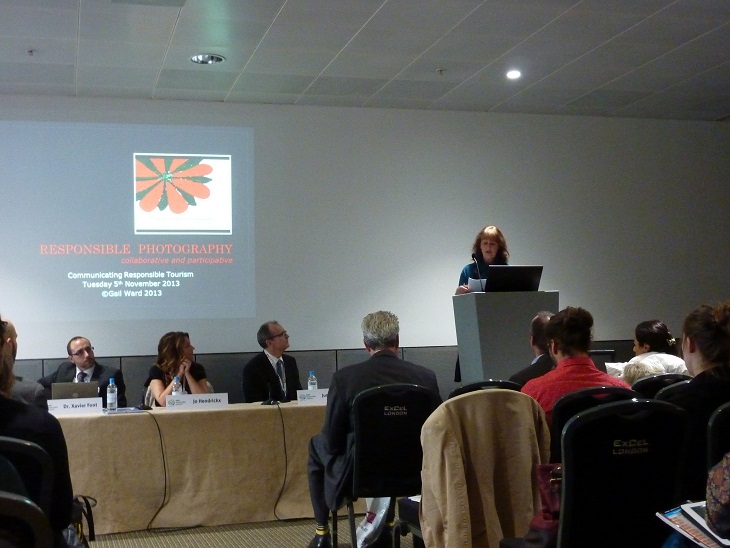
These days, many tour operators and hospitality businesses are keen to stress their 'green' credentials, and tell customers and investors that they practice forms of tourism that are variously described as 'sustainable', 'responsible', or environmentally benign. But is there a market advantage from doing so, and how can the message be presented in a way that potential customers can both understand and see as benefiting their holiday experience? According to one of the speakers at a session at the World Travel Market yesterday on 'Communicating Responsible Tourism: Securing Market Advantage', the best thing may be to not mention Responsible Tourism at all, at least if communicating to the mass market rather than niche customers. For the average consumer, talking about responsible tourism would first mean having to explain what the term means, and then trying to tell the customer why they should care about it, when all they really want is an enjoyable and good value holiday. To sell responsible or sustainable tourism, the panellists suggest that the key may be to start from the customer and understand their values, and then sell the holiday or excursion experience in ways that speak to what they want.
There is an ongoing debate about whether consumers are actually interested in sustainability. In some surveys, a high proportion of people will say that they are, but when asked if they have used it as a purchasing criteria few have. For some, selling a holiday or hotel stay as sustainable may even come over as a negative thing. Xavier Font from Leeds Metropolitan University presented VisitEngland figures at the WTM session which show that 46% of English consumers don't want to think about being green – they just want to relax. 33% believe sustainability claims are often ways to save money and/or reduce service (and in some cases they may be right), while 15% think a sustainably run hotel will be less comfortable than one without green credentials.
According to Xavier Font, rather than sustainability being highlighted in one separate section in a brochure or website, which is often the practice, it should be communicated throughout the product, but in ways that customers understand and value – when selling holidays you need to sell fun, authentic experiences, cultural immersion in a destination, or better service.
One good example of how this can be done was presented by Jo Hendrickx, Sustainable Destination Manager for Thomas Cook UK & Ireland. One part of responsible tourism is to use local suppliers of products and services, to ensure that more of the holiday spend brings benefits to the local communities. And while 'responsible' is an idea that may not mean a lot to most holidaymakers, 'local' is much more easily understood and seen as desirable. So Thomas Cook has started introducing a 'Local Label' for excursions, identifying excursions that are founded in sustainability and have positive impacts to local communities and economies.
Based on the Travel Foundation's Greener Excursions Checklist, the component parts of each excursion are checked against the relevant criteria (shopping, markets, food & drinks venues etc). If the criteria are met, the excursion can be promoted using the 'Local Label' logo and strapline and Thomas Cook representatives can communicate the benefits for the destination, the local community and local economy plus the added value to guests of taking such an excursion as they will get a more authentic and locally focussed experience.
While the programme was only launched this year, early results are promising. A comparison of take-up of a set of excursions which had already been available in 2012, but were marketed in 2013 using the Local Label, found a 27% greater take-up with the new marketing approach. Customer feedback has been generally positive, and suppliers are also happy. The programme is an example of showing that sustainability sells, if presented in the right way as giving a better and more authentic experience for the customer.
What came over in several of the presentations is that while customers may care about things being done in a more sustainable way, they don't necessarily want to have to think too much about it, or be presented choices between sustainable and non-sustainable options. They want the supplier to have done that work for them. Xavier Font and Leeds Metropolitan University have developed the 'respondeco' website which offers a service for marketing responsible tourism, and one of the suggestions is "focus on daytrips that are nearby rather than hours away, or cut out endangered or unsustainable food from the menu. No need to label as "green" either, just present as fun or a great idea."
Not every destination or tour company will follow responsible or sustainable practices for travel and tourism – if they are getting all the customers they need anyway, it is hard to persuade them to do things differently except where there are cost savings to be made. But in many cases there is a market advantage from doing business in an ethical and sustainable way - and the message from the WTM session is that these good practices may need to be communicated in a simpler and more effective way than is generally the case.
CABI’s Leisure Tourism Database has thousands of abstracts on responsible and sustainable tourism, and carries regular news and comment on the subject. Subscribers can find nearly 400 bibliographic records on marketing of responsible or sustainable tourism.
